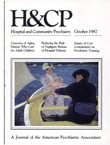Patient Access to Medical Records in a Forensic Center: A Controlled Study
Abstract
Several psychiatric facilities have opened their records partially or completely to patients. The authors report the results of a two-part study in which 20 patients on a minimum-security unit of a forensic center were allowed to read their records and later to write in them. Staff and patient attitudes toward granting patients access to their records were measured before and during the study and were compared with staff and patient attitudes on two units where patients were not granted access. Only eight study patients actually read their charts and none wrote in them, but the majority of both study and control patients felt that access had been helpful. No significant differences in patient behaviors were found on any of the units as a result of access. Staff attitudes toward access did not differ significantly before or after the study, and few differences were found in staff charting practices.
Access content
To read the fulltext, please use one of the options below to sign in or purchase access.- Personal login
- Institutional Login
- Sign in via OpenAthens
- Register for access
-
Please login/register if you wish to pair your device and check access availability.
Not a subscriber?
PsychiatryOnline subscription options offer access to the DSM-5 library, books, journals, CME, and patient resources. This all-in-one virtual library provides psychiatrists and mental health professionals with key resources for diagnosis, treatment, research, and professional development.
Need more help? PsychiatryOnline Customer Service may be reached by emailing [email protected] or by calling 800-368-5777 (in the U.S.) or 703-907-7322 (outside the U.S.).



